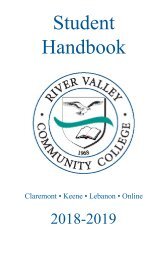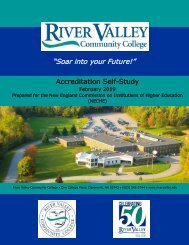You also want an ePaper? Increase the reach of your titles
YUMPU automatically turns print PDFs into web optimized ePapers that Google loves.
One area that came to light during the self-study process was the lack of a structured<br />
assessment plan in some of the liberal arts areas. While the accredited programs, as well<br />
as mathematics and sciences, have standard assessment timelines, English and social<br />
sciences do not. Administration supported the current VPAA in attending the Assessment<br />
Institute in Indianapolis in October 2018. VPAA Jahn was able to bring back a wealth of<br />
practical knowledge in the area and has been working on an assessment plan designed<br />
first for liberal arts courses, then moving to the liberal arts program as a whole, then to<br />
college-wide assessment.<br />
General Education<br />
The general education requirement is clearly outlined, as described above, in the Liberal<br />
Arts Core of <strong>RVCC</strong> that all associate degree programs must meet. The Liberal Arts Core<br />
directly informs and prepares students to meet the definition of the educated person as set<br />
out in the <strong>RVCC</strong> Philosophy. The Philosophy further identifies that students who graduate<br />
from <strong>RVCC</strong> should “[embrace] an understanding and appreciation of self in today's socially<br />
and technologically complex world, and through the stimulation of intellectual curiosity,<br />
learners will be able to improve their lives and contribute something of value to the<br />
community of which they are a part.” The goal of all programs, certificate or degree, is to<br />
prepare students to enter the world with increased skills relevant to their individual goals.<br />
All programs follow a developed program map which ensures that the general education<br />
requirements of the arts and humanities, science, social science, and mathematics inform<br />
and support the technical programs. Program Directors are thoughtful in their placement<br />
of the general education courses in their program maps and often general education<br />
courses are used as pre-requisite or co-requisites for technical program courses.<br />
<strong>RVCC</strong> follows the CCSNH BoT policy which requires a minimum of 20 credits in general<br />
education courses. Approximately 12-13 of these credits will come from the Liberal Arts<br />
Core, with the remaining credits being determined for each program depending on the<br />
need of that program, but coming from Humanities/Fine Arts/Language; Quantitative<br />
Reasoning; Science; or Social Science. The Associate of Arts Degree requires even more<br />
credits (37-40) in the general education subjects. The variability in credit load is a result of<br />
math courses being either 3 or 4-credit courses, and lab science having variable credit<br />
loads.<br />
Appraisal of General Education<br />
The general education requirements at <strong>RVCC</strong> follow the CCSNH System requirements and<br />
are designed to meet the standards set forth in River Valley’s definition of an educated<br />
person. The requirements ensure that students graduating from River Valley have<br />
exposure and meet minimum standards in English, math, science, social science, and<br />
humanities. Programs are allowed to fill electives as they see fit to meet the specific<br />
nature of the degree being awarded. This format allows for students to have some choice<br />
in their coursework while still allowing Program Directors the ability to ensure that the<br />
curriculum of study meets with the rigor and expectations of the industry they are<br />
preparing students for. For those students who intend to transfer to a four-year<br />
43 | P a g e





